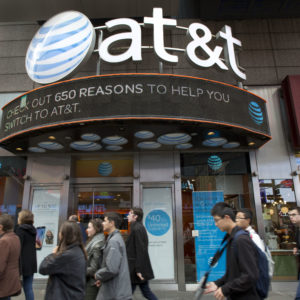The AT&T-Time Warner merger would hurt competition in the premium cable marketplace and raise antitrust concerns, according to an economist and Trump administration transition team member.
That’s the conclusion of a new study of the merger by Jeff Eisenach, an economist who served on the Trump administration’s transition team at the Federal Communications Commission. Eisenach and NERA Economic Consulting Director Timothy Watts said the vertical merger would incent AT&T to direct its millions of wireless and DirecTV subscribers to premium cable channels like HBO, owned by Time Warner, and away from competitors like Starz and Showtime.
“Our analysis shows there is a significant likelihood that the transaction would provide the merged firm with both the incentive and the ability to foreclose Starz and other premium channels and, by so doing, drive up their costs,” the study, paid for by Starz, reads.
According to Eisenach and Watts, AT&T could downplay or exclude marketing for Starz altogether. Starz produces popular shows like “American Gods” and “Ash vs. Evil Dead,” and like HBO, requires an additional subscription in cable packages to access its content. AT&T could also drop Starz and other competitors entirely.
If approved the merger would combine Warner Bros., the largest movie studio in the U.S. (owned by Time Warner), HBO — the largest premium cable channel in the country — and AT&T, the largest multichannel video programming distributor (MVPD) with 25.3 million subscribers, thanks to its acquisition of DirecTV in 2014. Comcast, the next largest MVPD, has 22.5 million subscribers.
Should antitrust regulators allow the $85 billion deal to go through, AT&T would have the first and only vertical market video chain stretching from the creation of content to its delivery directly to consumers.
“Starz does not know the identity of its MVPD subscribers, nor have any way of reaching them directly in the face of MVPD foreclosure,” the study reads. “Today, MVPDs are not vertically integrated with premium channels and thus have incentives to promote each premium channel based on its downstream profitability.”
Change the vertical relationship between AT&T and HBO, they warn, and AT&T “would consider the long-run benefits of weakening the ability of Starz and Showtime to constrain HBO’s market power against any short-run losses resulting from reduced profits from Starz and Showtime subscriptions.”
Not only would that reduce competition and consumer choice, “[t]he long-run payoff of such a strategy would be to allow AT&T to charge higher prices for HBO to its own subscribers, to other MVPDs, and ultimately to their subscribers.”
The scenario wouldn’t be a first for AT&T. The company has already been accused of discriminatory pricing by the FCC for delivering its own video content for free to wireless and DirecTV customers while charging for competitors like Netflix or Hulu.
AT&T responded to the study by pointing out Starz’s obvious competitive interest in blocking the deal.
“This conclusion doesn’t square with the facts,”AT&T spokesman Michael Balmoris said. “We fully expect the DoJ to base its analysis on the facts and the law, as it always does, and not the work of HBO’s competitors.”
But Starz is far from the merger’s lone critic. Congress raised similar concerns in December when they pressed AT&T CEO Randall Stephenson and Time Warner CEO Jeffrey Bewkes for commitments not to raise prices for Time Warner content, or limit its distribution to AT&T and DirecTV competitors.
Lawmakers also pressed the CEOs to pledge they wouldn’t agree to any demands by the Justice Department, where the deal must get antitrust approval, to rein in Time Warner-owned CNN. The cable news network produces overwhelmingly critical coverage of the Trump administration.
Trump son-in-law and senior adviser Jared Kushner met with Time Warner in February and discussed the network’s coverage of the president, described by Trump as “hateful” during a press conference the same month.
On the 2016 presidential campaign trail, then-candidate Trump said he would oppose the deal for putting “too much concentration of power in the hands of too few.” Eisenach worked for Trump at the FCC during the presidential transition.
AT&T will not be acquiring any Time Warner broadcast licenses as part of the deal, and as a result won’t face FCC scrutiny according to FCC Chairman Ajit Pai. Democrats had hoped the FCC would subject the merger to their more scrutinizing antitrust test, which requires companies to demonstrate benefits to consumers.

